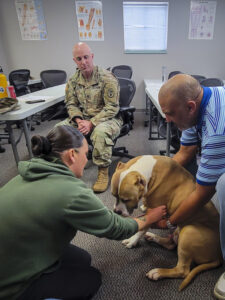
Courtesy Story
Blanchfield Army Community Hospital
FORT CAMPBELL, Ky. — The Army Veterinarian Corps celebrates 108 years of service to our nation June 3. The Soldiers and staff of the Fort Campbell Veterinarian Clinic strive to provide the best animal, food and public health support to the entire Fort Campbell community.
“I’m proud to be able to support our broad, diverse mission,” says Capt. Colleen Meuse, Fort Campbell Vet Clinic Veterinarian.
According to Meuse, the main areas of support include animal care for military working dogs (MWD) and civilian pets, food safety and defense, and agricultural decontamination, also known as bio-security. This multi-faceted task keeps staff busy whether in garrison or forward deployed.
The animal care mission primarily focuses on military working dogs, ensuring they are ready to deploy when needed. The veterinary clinic offers routine check-ups, minor surgeries, and required preventive shots. Additionally, the clinic provides primary care for civilian pets and issues health certificates for overseas permanent change of station travel. These certificates confirm compliance with international animal regulations, a process that can be complex and time-consuming.
“Please get your pet health certificate requirements started as soon as notification of orders comes in. In some cases, getting a health certificate for your pet can take up to 180 days or more. Your pet may be put into quarantine until the requirements of that area are met,” said Meuse.
Another priority of the Vet Corps and their Fort Campbell clinic is food safety and defense.
“Anywhere the Army goes, we must eat food. The Army Vet Corps ensures that food is safe to eat,” Meuse added.
The vet staff here participates in the inspection of all commercial food products brought on post and conducts regular audits of the shoppettes and commissary, ensuring sanitation requirements and adherence to any FDA food recalls.
Veterinary Corps history shows food safety is as relevant today as it was in the early 1900s. In the past, it was common for soldiers to process animals to feed the troops. Today, they rely on food inspected by a preventative medicine, public health, and veterinary corps team. However, their responsibilities extend beyond food safety.
“Another one of our missions that not many people realize that we do is to supervise the sanitation of vehicles and machinery before we send them into foreign countries, and when they return,” said Meuse.
The health and safety responsibilities of the Veterinary Corps mission also extend into agricultural decontamination and biosecurity. These preventative measures help ensure that regional or host nation-specific contaminants do not accompany soldiers and equipment back home or to other countries and regions during travel.
Even when forward deployed, the veterinarian mission is still focused on health and safety. MWDs, food inspection, and bio-security are always mission priorities; however, they are adapted to fit within the operational environment, according to Meuse.
Even in deployed settings, the veterinarian mission remains firm in its focus on health and safety. Prioritizing tasks such as caring for MWDs, conducting food inspections, and maintaining biosecurity measures, the mission is adapted to suit the operational environment, as explained by Meuse.
The Army Veterinarian Corps was formally established June 3rd, 1916, and still faithfully serves its ever-evolving role of protecting Animals, Soldiers, and their families.